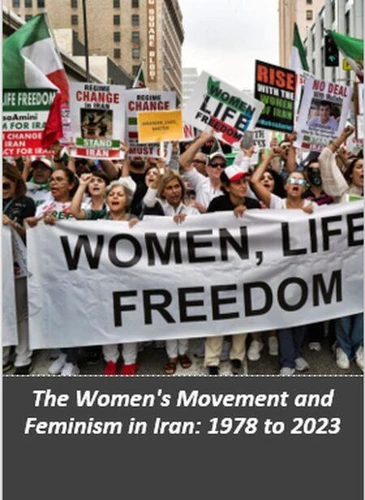The Women’s Movement and Feminism in Iran: 1978 to 2023
Par :Formats :
Disponible dans votre compte client Decitre ou Furet du Nord dès validation de votre commande. Le format ePub est :
- Compatible avec une lecture sur My Vivlio (smartphone, tablette, ordinateur)
- Compatible avec une lecture sur liseuses Vivlio
- Pour les liseuses autres que Vivlio, vous devez utiliser le logiciel Adobe Digital Edition. Non compatible avec la lecture sur les liseuses Kindle, Remarkable et Sony
 , qui est-ce ?
, qui est-ce ?Notre partenaire de plateforme de lecture numérique où vous retrouverez l'ensemble de vos ebooks gratuitement
Pour en savoir plus sur nos ebooks, consultez notre aide en ligne ici
- FormatePub
- ISBN8223066255
- EAN9798223066255
- Date de parution11/05/2023
- Protection num.pas de protection
- Infos supplémentairesepub
- ÉditeurDraft2Digital
Résumé
The Iranian feminist movement has faced many challenges, including the divide between secular and Islamic feminists and those inside and outside Iran. However, collaborations between Iranian feminist activists, including those outside Iran, have helped break down these walls. One significant contribution to the feminist movement in Iran was the feminist magazine "Zanan, " which featured interviews with prominent intellectuals and reformists, including male thinkers, and criticized their lack of attention to gender issues and women's rights.
Although "Zanan" was shut down during Ahmadinejad's presidency, its founder, Shahla Sherkat, relaunched the magazine as "Zanane Emrooz" in 2014. However, the magazine faced pressure from hardliners and was forced to cease publication again in 2016. Despite these challenges, the Iranian feminist movement continues to persist and fight for gender equality. This book discusses the concept of "Islamic feminism", which represents a feminist voice within the process of religious reform in Islam.
This movement has emerged in recent decades in many Muslim-majority countries and among Muslim minorities in Western countries. However, the term "Islamic feminism" has caused much debate and confusion, with opposing views from both conservative Islamic and secular feminist groups. Some conservative Muslims and Islamists reject Islamic feminism due to their anti-feminist beliefs, while some secular feminists view it as contradicting their anti-Islamic sentiments.
This categorization has led some scholars to express concern that it may cause further division and confusion.
Although "Zanan" was shut down during Ahmadinejad's presidency, its founder, Shahla Sherkat, relaunched the magazine as "Zanane Emrooz" in 2014. However, the magazine faced pressure from hardliners and was forced to cease publication again in 2016. Despite these challenges, the Iranian feminist movement continues to persist and fight for gender equality. This book discusses the concept of "Islamic feminism", which represents a feminist voice within the process of religious reform in Islam.
This movement has emerged in recent decades in many Muslim-majority countries and among Muslim minorities in Western countries. However, the term "Islamic feminism" has caused much debate and confusion, with opposing views from both conservative Islamic and secular feminist groups. Some conservative Muslims and Islamists reject Islamic feminism due to their anti-feminist beliefs, while some secular feminists view it as contradicting their anti-Islamic sentiments.
This categorization has led some scholars to express concern that it may cause further division and confusion.
The Iranian feminist movement has faced many challenges, including the divide between secular and Islamic feminists and those inside and outside Iran. However, collaborations between Iranian feminist activists, including those outside Iran, have helped break down these walls. One significant contribution to the feminist movement in Iran was the feminist magazine "Zanan, " which featured interviews with prominent intellectuals and reformists, including male thinkers, and criticized their lack of attention to gender issues and women's rights.
Although "Zanan" was shut down during Ahmadinejad's presidency, its founder, Shahla Sherkat, relaunched the magazine as "Zanane Emrooz" in 2014. However, the magazine faced pressure from hardliners and was forced to cease publication again in 2016. Despite these challenges, the Iranian feminist movement continues to persist and fight for gender equality. This book discusses the concept of "Islamic feminism", which represents a feminist voice within the process of religious reform in Islam.
This movement has emerged in recent decades in many Muslim-majority countries and among Muslim minorities in Western countries. However, the term "Islamic feminism" has caused much debate and confusion, with opposing views from both conservative Islamic and secular feminist groups. Some conservative Muslims and Islamists reject Islamic feminism due to their anti-feminist beliefs, while some secular feminists view it as contradicting their anti-Islamic sentiments.
This categorization has led some scholars to express concern that it may cause further division and confusion.
Although "Zanan" was shut down during Ahmadinejad's presidency, its founder, Shahla Sherkat, relaunched the magazine as "Zanane Emrooz" in 2014. However, the magazine faced pressure from hardliners and was forced to cease publication again in 2016. Despite these challenges, the Iranian feminist movement continues to persist and fight for gender equality. This book discusses the concept of "Islamic feminism", which represents a feminist voice within the process of religious reform in Islam.
This movement has emerged in recent decades in many Muslim-majority countries and among Muslim minorities in Western countries. However, the term "Islamic feminism" has caused much debate and confusion, with opposing views from both conservative Islamic and secular feminist groups. Some conservative Muslims and Islamists reject Islamic feminism due to their anti-feminist beliefs, while some secular feminists view it as contradicting their anti-Islamic sentiments.
This categorization has led some scholars to express concern that it may cause further division and confusion.



